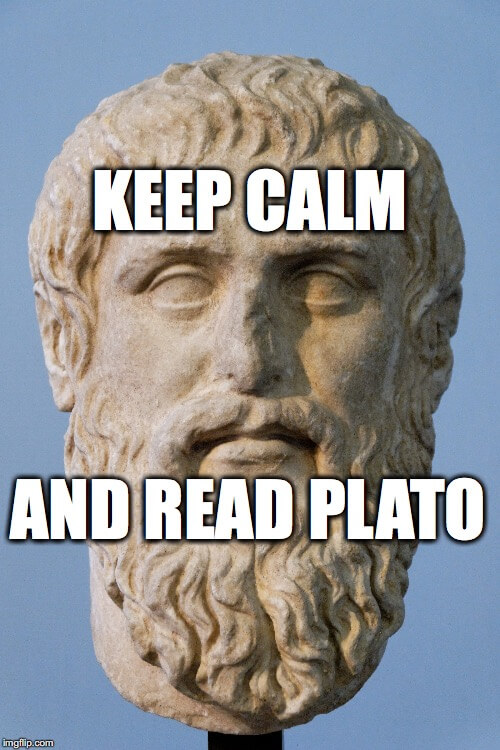How to Read Plato

Plato is one of those old, ancient philosophers—a Greek no less. That necessarily means he will be hard to read—and boring. Far better would it be to read a book about Plato rather than actually read his stuff. Besides just being old and Greek, he wrote dialogues. Who writes dialogues anymore? Write an essay or write a novel but don’t write dialogues! I couldn’t imagine having to read something so boring or confusing.
And yet, here I am writing a post on how to read Plato. Why? Well, for one, I don’t actually believe what I just wrote above—Plato is not boring—as well as because of something C.S. Lewis famously once wrote in God in the Dock, If a man…
must read only the new or only the old, I would advise him to read the old. And I would give him this advice precisely because he is an amateur and therefore much less protected than the expert against the dangers of an exclusive contemporary diet.
We tend toward reading new books about old books because we think them easy and safe. Lewis argues the exact opposite. So how does one read Plato?
The first and most important rule one can hold to while reading Plato is to approach the work as an example of how to think rather than as a communiqué of what to think. Plato wrote dialogues, and those dialogues—whether he intended it or not—teach us how to think. They serve as examples, and they also provide various tools to provoke us into thinking.
In fact, they provide three tools Plato regularly uses to provoke us into thinking: positive statements, negative statements, and contradictory statements.
Sometimes Plato will put forth a positive statement that serves to drive us into further thinking. When Socrates says in the Republic that the poets should be banned from his city, he is providing a positive statement that should necessarily cause us to question him. Rather than assume he actually meant those words, one ought to use it as a motivation to think further on the subject. Ask yourself, “Why would Plato want to exclude the poets?” or “Why would anyone want to exclude the poets?” and “What do poets do that are good for society, and what do they do that might be bad for it?”
Sometimes Plato will put forth a negative statement that serves to drive us into further thinking. When Socrates says in the Phaedrus that we shouldn’t write things down, especially speeches, again, we ought not to assume that he meant those words without actually questioning why he would say them. What has the written word done for me that is good, that is bad? One of Socrates’ arguments, for example, is that the writer needs to order his speech to the kind of soul he is addressing, but in the case of the written word he cannot know what kind of souls will read his speech. Is it true that the wrong person (the wrong kind of soul) has read a book that would have been suitable for another and that book has done harm to him?
Sometimes Plato will put forth statements that are themselves contradictory. Sometimes he says X is true and sometimes he says –X is true. Since both X and –X cannot be true, then we are forced to ask: which is true or is neither true? In the Republic, Socrates says that poets create images in direct imitation of their ideal types in heaven, in another place he says they create images in imitation of imitations and are therefore unreliable. Which is it? Is the former true? The latter? Are neither true? Is the former true in the case of some poets and the latter in the case of others?
By asking these kinds of questions of Plato’s (or should I say Socrates’) statements, we are learning to think philosophically. We are learning to think. We are learning how to think.
The best way to read Plato is not to try to figure out—from what are sometimes cryptic statements and fragmented thoughts—what he really believed. The best way to read Plato is to learn from him how to be dialectic. Or, to put it in terms we are more familiar with in classical education circles: The best way to read Plato is to learn from him how to think Socratically—rather than how to seem to think what Socrates thought.
Dr. Matthew Bianco
Dr. Matthew Bianco is the Chief Operations Officer for the CiRCE Institute, where he also serves as a head mentor in the CiRCE apprenticeship program. A homeschooling father of three, he has graduated all three of his children, the eldest of whom graduated from St. John's College in Annapolis, MD. His second and third both graduated from Belmont Abbey College in Charlotte, NC. He is married to his altogether lovely high school sweetheart, Patricia. Dr. Matt Bianco has a PhD in Humanities from Faulkner University's Great Books Honors College and wrote his dissertation on Plato's Republic and education. He is the author of Letters to My Sons: A Humane Vision for Human Relationships.










